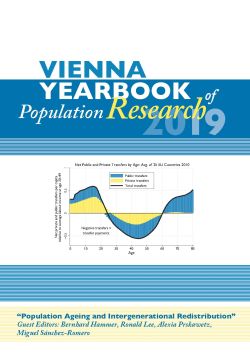
Vienna Yearbook of Population Research 2019, pp. 121-140, 2019/12/02
Special issue on Population ageing and intergenerational redistribution

This paper presents an analysis of the age patterns of production, consumption, and net transfers in the form of unpaid work by gender over time. Using the National Time Transfer Accounts (NTTA) methodology, we briefly analyse complete historical results for several European countries. Our main aim is to introduce historical NTTA results, which are freely available to the public for further usage on the AGENTA database. The results of our analysis show that the evolution of age patterns over time differed between men and women, and was highly affected by different demographic trends, as well as by the specific institutional background of each country. Our findings indicate that despite the differences in age patterns over time and across countries, two main characteristics of these patterns did not change: i.e. transfers of unpaid work flowed first from women to men, and second from the working-age population to children and – to a lesser extent – to the elderly.